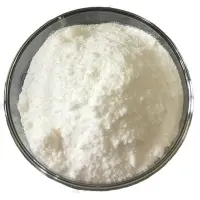-
Categories
-
Pharmaceutical Intermediates
-
Active Pharmaceutical Ingredients
-
Food Additives
- Industrial Coatings
- Agrochemicals
- Dyes and Pigments
- Surfactant
- Flavors and Fragrances
- Chemical Reagents
- Catalyst and Auxiliary
- Natural Products
- Inorganic Chemistry
-
Organic Chemistry
-
Biochemical Engineering
- Analytical Chemistry
-
Cosmetic Ingredient
- Water Treatment Chemical
-
Pharmaceutical Intermediates
Promotion
ECHEMI Mall
Wholesale
Weekly Price
Exhibition
News
-
Trade Service
Rheumatoid arthritis is an autoimmune disease of complex etiology characterized by joint destruction, systemic organ involvement, and elevated titers of autoantibodies such as anti-citrullinated peptide antibodies (ACPA)
.
Gut microbiota plays a crucial role in maintaining immune homeostasis.
Although studies have shown that gut microbes are related to the pathogenesis of rheumatoid, the mechanism is not yet fully understood
.
The composition of individual gut microbes is highly diverse and greatly affects the identification of disease-related microbial signatures
.
Recently, Li Zhanguo's team from the Department of Rheumatology and Immunology, Peking University People's Hospital, and the team of Associate Researcher Kang Yu from Beijing Institute of Genomics, Chinese Academy of Sciences (National Center for Bioinformatics) collaborated to publish a paper entitled: Intestinal butyrate-metabolizing species contribute to autoantibody in Science Advances, a sub-journal of Science Research paper on production and bone erosion in rheumatoid arthritis
.
This study found that butyrate metabolizing bacteria in the gut of rheumatoid patients participated in rheumatoid arthritis disease activity, antibody production and joint deformation by affecting the net content of butyric acid in the gut, revealing that butyrate metabolizing bacteria in the gut play a role in the pathogenesis of rheumatoid arthritis.
The key role in the mechanism, and the molecular mechanism by which butyrate modulates the immune response in patients with rheumatoid arthritis, suggest the potential of butyric acid for the clinical treatment of rheumatoid arthritis
.
In this study, the researchers used a new metagenomic analysis strategy, the "class pairing" algorithm, to solve the problem of insufficient detection efficiency of characteristic microbiota caused by the high diversity and host heterogeneity of the human gut microbiota
.
This strategy is similar in principle to twin studies to identify disease-associated genetic variants
.
In high-dimensional metagenomic data, samples with highly similar components but belonging to different groups (case-control) are regarded as "twins", that is, paired samples, and metagenomic data analysis is performed based on the newly formed paired sample cohort.
This allows for better control of high diversity among individuals, increased statistical power, and improved sensitivity and robustness for identifying disease-associated microbiome signatures
.
In this study, using the "class pairing" algorithm, it was not only found that a variety of butyric acid-producing bacteria and butyric acid-consuming bacteria showed opposite distribution trends in the intestinal composition of rheumatoid patients and healthy people, but also the abundance of these butyric acid metabolism-related species There is a strong correlation with clinical indicators such as ACPA antibody and rheumatoid factor
.
The diagnostic model established based on the abundance of these butyrate metabolizing bacteria can not only accurately distinguish patients from healthy people, but also predict joint deformation in patients with an accuracy rate of 98.
6%
.
In order to verify the role of butyric acid metabolism in the pathogenesis and inflammatory response of rheumatoid, the research team further carried out research on the metabolome of feces and blood, immune cell function of patients with rheumatoid arthritis, and animal models of collagen-induced arthritis.
It has been confirmed that the blood and fecal butyrate concentrations of patients with rheumatoid arthritis are lower than those of healthy people, while normal butyrate concentrations can down-regulate the expression of various pro-inflammatory factors, induce Treg cell differentiation, and inhibit Th17 and follicular helper T cells ( Tfh) and osteoclast activity; adding butyrate supplements to the diet of rheumatoid model mice can significantly inhibit the occurrence of arthritis, promote the balance of Tfh and Treg, and reduce the production of autoantibodies
.
This study revealed the key role of butyrate metabolites in the gut in the pathogenesis and development of rheumatoid arthritis, and also provided a theoretical basis for improving rheumatoid arthritis through diet or microbial therapy in the future
.
Kang Yu, Yu Jun, Peking University People's Hospital Li Zhanguo and He Jing are the corresponding authors of the paper
.
He Jing from Peking University People's Hospital, Chu Yanan from Beijing Genomics Institute (National Bioinformatics Center), Li Jing from Peking University People's Hospital, and Meng Qingren from Southern University of Science and Technology are the co-first authors
.
Link to the paper: https:// Open for reprinting, welcome to forward to Moments and WeChat groups
.
Gut microbiota plays a crucial role in maintaining immune homeostasis.
Although studies have shown that gut microbes are related to the pathogenesis of rheumatoid, the mechanism is not yet fully understood
.
The composition of individual gut microbes is highly diverse and greatly affects the identification of disease-related microbial signatures
.
Recently, Li Zhanguo's team from the Department of Rheumatology and Immunology, Peking University People's Hospital, and the team of Associate Researcher Kang Yu from Beijing Institute of Genomics, Chinese Academy of Sciences (National Center for Bioinformatics) collaborated to publish a paper entitled: Intestinal butyrate-metabolizing species contribute to autoantibody in Science Advances, a sub-journal of Science Research paper on production and bone erosion in rheumatoid arthritis
.
This study found that butyrate metabolizing bacteria in the gut of rheumatoid patients participated in rheumatoid arthritis disease activity, antibody production and joint deformation by affecting the net content of butyric acid in the gut, revealing that butyrate metabolizing bacteria in the gut play a role in the pathogenesis of rheumatoid arthritis.
The key role in the mechanism, and the molecular mechanism by which butyrate modulates the immune response in patients with rheumatoid arthritis, suggest the potential of butyric acid for the clinical treatment of rheumatoid arthritis
.
In this study, the researchers used a new metagenomic analysis strategy, the "class pairing" algorithm, to solve the problem of insufficient detection efficiency of characteristic microbiota caused by the high diversity and host heterogeneity of the human gut microbiota
.
This strategy is similar in principle to twin studies to identify disease-associated genetic variants
.
In high-dimensional metagenomic data, samples with highly similar components but belonging to different groups (case-control) are regarded as "twins", that is, paired samples, and metagenomic data analysis is performed based on the newly formed paired sample cohort.
This allows for better control of high diversity among individuals, increased statistical power, and improved sensitivity and robustness for identifying disease-associated microbiome signatures
.
In this study, using the "class pairing" algorithm, it was not only found that a variety of butyric acid-producing bacteria and butyric acid-consuming bacteria showed opposite distribution trends in the intestinal composition of rheumatoid patients and healthy people, but also the abundance of these butyric acid metabolism-related species There is a strong correlation with clinical indicators such as ACPA antibody and rheumatoid factor
.
The diagnostic model established based on the abundance of these butyrate metabolizing bacteria can not only accurately distinguish patients from healthy people, but also predict joint deformation in patients with an accuracy rate of 98.
6%
.
In order to verify the role of butyric acid metabolism in the pathogenesis and inflammatory response of rheumatoid, the research team further carried out research on the metabolome of feces and blood, immune cell function of patients with rheumatoid arthritis, and animal models of collagen-induced arthritis.
It has been confirmed that the blood and fecal butyrate concentrations of patients with rheumatoid arthritis are lower than those of healthy people, while normal butyrate concentrations can down-regulate the expression of various pro-inflammatory factors, induce Treg cell differentiation, and inhibit Th17 and follicular helper T cells ( Tfh) and osteoclast activity; adding butyrate supplements to the diet of rheumatoid model mice can significantly inhibit the occurrence of arthritis, promote the balance of Tfh and Treg, and reduce the production of autoantibodies
.
This study revealed the key role of butyrate metabolites in the gut in the pathogenesis and development of rheumatoid arthritis, and also provided a theoretical basis for improving rheumatoid arthritis through diet or microbial therapy in the future
.
Kang Yu, Yu Jun, Peking University People's Hospital Li Zhanguo and He Jing are the corresponding authors of the paper
.
He Jing from Peking University People's Hospital, Chu Yanan from Beijing Genomics Institute (National Bioinformatics Center), Li Jing from Peking University People's Hospital, and Meng Qingren from Southern University of Science and Technology are the co-first authors
.
Link to the paper: https:// Open for reprinting, welcome to forward to Moments and WeChat groups







